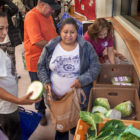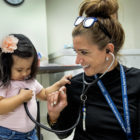Disparities/Environmental Health
Industrial Farming Outweighs Willpower In Obesity Crisis, Experts Say
|
Industrial-scale farming and food processing are greater factors in rising obesity numbers in Connecticut and worldwide than individual behavior, scientists say. This complex food system feeds directly into greenhouse gas emissions and accelerated climate change. Last year the journal The Lancet identified a global “syndemic” linking climate change to obesity and poor nutrition, referencing dozens of studies. Earlier, in 2017, the journal Public Health reported “significant and new insight about the causal link between obesity and environmental emissions.”
In Connecticut, 27% of all adults, almost 12% of children and 14% of toddlers (ages 2-4) have obesity. In 1990, the rate for adults was 10%, reports Connecticut Data Haven in its 2019 Community Health Well-Being Survey.


